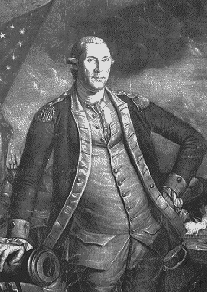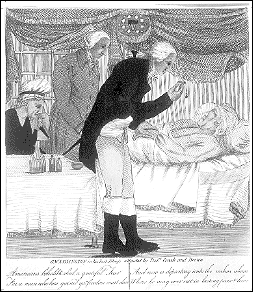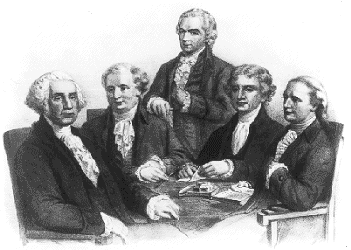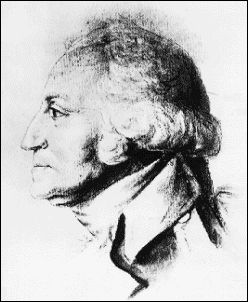
The Surprising George Washington
Spring 1994, Vol. 26, No. 1
By Richard Norton Smith
© 1994 by Richard Norton Smith
In the autumn of 1787, newly returned from Constitution-making in Philadelphia, the proprietor of Mount Vernon turned his attention to more prosaic matters. George Washington needed a gardener, and he approached the job search with the same psychological insight that had so impressed his fellow delegates. At length he drew up a contract with a hard-drinking candidate, after solemnly binding him to perform his duties sober for one year "if allowed four dollars at Christmas, with which to be drunk four days and four nights; two dollars at Easter, to effect the same purpose; two dollars at Whitsuntide, to be drunk for two days, a dram in the morning, and a drink of grog at dinner and at noon."
It was vintage Washington: a fine medley of bemused tolerance for human frailty and the rigidly methodical demands made upon himself across a lifetime of self-improvement. Nearly two hundred years after his death, no American is more instantly recognizable to--or more remote from--his descendants. Standing in a thousand city parks, frozen in marbled veneration, the Father of His Country inspires more awe than affection. According to Newsweek, 14 percent of all American preschoolers think that George Washington is still sitting in the Oval Office. To the rest of us, Washington appears every February to sell cars and appliances before vanishing into the historical mists, the Ultimate Dead White Male.
His contemporaries were less willing to let him go. On the last night of his life, having defied the might of the British empire and planted the seeds of republican government, the old hero was invited to challenge the very laws of nature. Among those who learned of Washington's lethally sore throat was his friend William Thornton, a practicing doctor and amateur architect who had secretly designed the new Capitol building in Washington city as a final resting place for his friend. In hopes of forestalling that event, Dr. Thornton hurried to Mount Vernon to perform an emergency tracheotomy.
He arrived too late, or so it seemed to everyone but the good doctor. Refusing to accept the verdict of death, this quintessential child of the Enlightenment proposed to resurrect Washington "in the following manner. First to thaw him in cold water, then to lay him in blankets, and by degrees and by friction to give him warmth, and to put into activity the minute blood vessels, at the same time to open a passage to the lungs by the trachea, and to inflate them with air, to produce an artificial respiration, and to transfuse blood into him from a lamb."
Washington's friends intervened to permit him a peaceful departure. Yet just four years later, John Marshall would attempt in five ponderous volumes what Dr. Thornton had only theorized with his blankets and his lamb's blood--to restore George Washington to life. By most accounts he failed. According to the waspish John Adams, Marshall's work was not a biography at all but "a Mausoleum, one hundred feet square at the base and two hundred feet high."
Artists fared no better than writers. Even during Washington's lifetime, family members complained that his portraits barely did him justice. Gilbert Stuart insisted that conveying Washington's personality on canvas was the most difficult thing in the world. In truth, Stuart and Washington did not exactly hit it off during their numerous sessions together, and the painter's revenge--the so-called postage slot mouth caused by stuffing cotton in place of the President's badly made dentures--has shaped, or warped, our image of Washington ever since.
Sooner or later everyone who writes about Washington must come to terms with the bloodless image stamped upon our currency and our car sales. In an age suspicious of heroics and squeamish about duty, it is no exaggeration to say that our first President falls victim to his own well-publicized virtues. Blame it on Parson Weems and his adulatory imitators, who robbed Washington's life of conflict, tension, and the slowly gathering forces of character. Since few of us can identify with human perfection, it is hardly surprising that Weems's Saint George should have inspired the shallow debunkers of the 1920s or the well-meaning yet distorting "humanizers" of more recent years. All too often the humanizers wound up merely trivializing Washington, telling us more than we need to know about his false teeth and expense accounts, his shadowy passion for Sally Fairfax, or his amply documented lust for land and social status.
In the words of Oscar Wilde, "the only duty we have to history is to rewrite it." From the beginning, my ambition was not to create a Washington for our times, but rather to live with the man in his own times and on his own terms. Imagine yourselves in the presence of George Washington in the spring of 1789. The man before you is fifty-seven years old, of noble carriage and an almost regal gravitas. At six feet three inches tall, he towers over most of his contemporaries by at least half a foot. His two hundred pounds are evenly distributed over a bony, muscular frame hardened by a lifetime of outdoor exercise and physical adversity. The symmetry of Washington's face is ruined by a blunt Roman nose and cavernous sockets in which rest eyes variously described as blue or gray, dull or flashing.
By modern standards Washington would be nearly eighty years old in this, the first spring of his presidency. The chestnut hair of his youth is turning white; contrary to popular imagery, he never wore a wig. The President's low, rather indistinct voice makes him anything but a Great Communicator. In fact, he is painfully awkward when delivering a speech. Elevating a shortcoming to the level of principle, he advises a nephew elected to the Virginia Assembly against becoming what he calls "a babbler." George Washington is no babbler.
Contemporaries find it easier to describe Washington than to explain him. Abigail Adams made a good start at both when she wrote, "He has a dignity which forbids familiarity mixed with an easy affability which creates love and reverence." Abigail's cranky husband was somewhat less generous toward the President, whom he referred to in a fit of jealousy as Old Muttonhead. In any event, the love of which Mrs. Adams spoke was bound to be somewhat impersonal, for the hero who would give his name to one U.S. state, a capital city, thirty-three counties, at least seven mountains, nine colleges, and 121 post offices was unable to pass it on to another human being.
Washington accepts his childlessness with the same unbending discipline that governs his whole life, and that has isolated him from all but a handful of people. "Be courteous to all, intimate with few," he urged his nephew Bushrod, "for true friendship is a plant of slow growth."
As a result, the most famous man on earth has few intimates. Not even Martha knows all there is to know about the shrewd giant who prefers farming to politics and loses money on both; the expansive host who spends every penny of his twenty-five-thousand-dollar salary and complains that servants are drinking his Madeira; the iron-willed leader who has intractable ideas of personal honor and justice; the wryly satirical observer with a cordial, not always concealed dislike of tiresome preachers, financial deadbeats, and virtually anyone with the effrontery to question his motives or challenge his dignity; the painfully sensitive public figure who writhes under the criticism of newspapermen he condemns for "stuffing their papers with scurrility and nonsensical declamation"; the Spartan eater who favors pineapples, Brazil nuts, and Saturday dinners of salt cod; and the true stoic who endures near constant toothache caused by ill-fitting dentures that cause his mouth to bulge and his lips to clamp shut in unsmiling repose.
About those teeth . . . According to John Adams, Washington lost his teeth as the result of cracking Brazil nuts between his jaws. By the time he became President, he had but a single tooth left and a set of dentures fashioned from cow's teeth. In hopes of finding something better, Washington contacted a leading dentist in Philadelphia, who produced a state-of-the-art set carved, not from wood, but from hippopotamus tusk. The new dentures were thoughtfully drilled with a hole to fit over his one remaining tooth. Unfortunately, they also rubbed against this natural tooth, causing more or less constant pain for which the President took laudanum.
So much for the wooden teeth. What about other Washington legends? We can write off the cherry tree as a product of Parson Weems's sugary imagination. No Washington myth is easier to dismiss than the story of his hurling a coin across the Potomac (or Rappahannock?) if only because no man was less likely to throw away a dollar. "Many mickles make a muckle" Washington liked to tell anyone who would listen, and he was as frugal in his personal lifestyle as he was profligate in furnishing an official residence and projecting the new nation's sense of importance.
If anything, Washington may have succeeded too well in crafting an image of republican dignity. Even during his lifetime, Washington was a figure deliberately set apart, wrapped in a paternal mystique until it became a psychological straightjacket. An observer writing in the spring of 1790 said that the President wore "a look of habitual gravity, sobriety that stopped short of sadness." It is not difficult to understand why. At the height of his fame, Washington was no longer at the peak of his form. His memory was failing, or so he claimed. His hearing was unreliable. Most of all, he dreaded the presidency's inevitable toll on his popularity and selfless reputation.
"I fear I must bid adieu to happiness," he blurted out to a close friend only days before his inaugural, "for I see nothing but clouds and darkness before me; and I call God to witness that the day which shall carry me again into public life will be a more distressing one than any I have ever yet known."
Interestingly, Washington had said much the same thing when chosen to command America's raw military in 1775. He turned to Joseph Addison's popular play Cato for a favorite epigraph: "Tis not in mortals to command success." It seems an odd credo from one who would spend a lifetime battling inner conflicts and external enemies, yet George Washington had always been a man of unsuspected depths, torn between his desire for fame and his disillusionment over its consequences.
It is hard to imagine in this day of bloated budgets, but Washington employed more people at Mount Vernon than he did in the entire executive branch of government. The first federal budget was around two million dollars, of which ten thousand dollars went to refurbish an executive residence in New York. The United States Army numbered six hundred men. At the State Department, Jefferson found a toy bureaucracy of five clerks spending eight thousand dollars a year to administer the foreign service, oversee territorial affairs, prepare the census, instruct federal marshals and attorneys in their duties, recommend executive pardons, and correspond with state officials as the government's designated intermediary. At thirty-five hundred dollars, Jefferson's salary was less than the Vice President's but more than Attorney General Edmund Randolph was paid to head his "mongrel department." If Randolph had a consolation, it lay in his freedom to compete for private business with New York's 121 other lawyers.
On his own initiative Washington established the cabinet as a sort of privy council. Inevitably it became an arena of conflict, its protagonists stock figures—or stick figures—in later history books: led by Jefferson, apostle of the yeoman, versus Hamilton, the mercantile prophet; one an aristocrat who lived on a mountaintop and considered himself a friend to man; the other a self-made elitist with a Calvinist belief in original sin. Like fire and frost, they were temperamental opposites whom not even Washington could reconcile.
More than a few historians have described Washington as a bit player shunted to the wings by more dynamic actors like Hamilton and Jefferson--a front for one, a foil for the other, a thin-skinned, stouthearted figurehead. I think it is more accurate to say that he was sufficiently sure of himself to allow Hamilton and Jefferson their street brawl. After all, his chief interest was in delaying the formal start of party warfare as long as possible. By deferring to both men, he kept each in his official family long after he wished to be free. The political general had not lost his touch.
In the end, Washington proved more visionary than either of his warring subordinates. One might even say that his whole presidency can be seen as an exercise in buying time. Stay out of Europe's murderous quarrels, he reasoned, and given twenty or thirty years of peaceful development, the United States would be in a position to defy any power on earth. Many, perhaps most, Americans disagreed with his neutrality. For a while France's meddlesome envoy Citizen Genet deluded himself into believing that he could appeal over the President's head and win popular support for war with England.
Once again, however, Washington's policy of watchful waiting, combined with his instinctive reading of popular opinion, served him and the young republic well. For eight years he offered himself up as a punching bag to intemperate critics, among them a newspaper editor hired by Jefferson with State Department funds. Scribbling partisans called him a dupe of King George, a betrayer of the Revolution. When the Philadelphia Aurora revealed that he had overdrawn his salary to pay the heavy costs of official entertaining, Washington suffered the tortures of the damned but he never complained, publicly.
Washington's private life, though not without its trials, provided a satisfying counterpoint to the splendid misery of partisan combat. Although content to live in her husband's shadow, Martha Washington commanded respect from all but the most frivolous elements of Philadelphia society. Accustomed as an army wife to living in other people's houses, Martha accepted life in Philadelphia without complaint but also without enthusiasm.
"I am only fond of what comes from the heart," she explained in the most revealing letter she ever wrote. "I know too much of the vanity of human affairs to expect felicity from the splendid scenes of public life. I am still determined to be cheerful and happy, in whatever situation I may be; for I have also learned from experience that the greater part of our happiness or misery depends upon our dispositions, and not upon our circumstances. We carry the seeds of the one or the other about with us, in our minds, wherever we go."
Washington subscribed to his wife's stoical creed. His advice to a female relation contemplating marriage speaks volumes: "Experience will convince you that there is no truth more certain than that all our enjoyments fall short of our expectations; and to none does it apply with more force, than to the gratification of our passions." There is sadness distilled in those words, along with rare wisdom. Bleak as it may sound, Washington's assessment of the most basic human desire--to love and to be loved--tells us a great deal about what was missing in his life. But it also suggests the coldblooded realism that made him impervious to the political passions of his day.
Summing up, one is tempted to judge his presidency not so much for what he did as for what he did not do. He did not make his Vice President a kind of prime minister, as he could have under the vaguely worded terms of the Constitution. He did not designate Hamilton as an American chancellor of the exchequer. He did not organize a king's party, even if he did come to abandon his pretense of strict impartiality between Federalist and Republican. Most of all, he did not allow himself to be swept up in the war hysteria of Anglophile and Francophile. Unlike Woodrow Wilson, George Washington actually did keep us out of war, at considerable cost to his short-term popularity, if not to his historical reputation.
But of course, he supplied positive leadership as well. Every action he took established a precedent to guide his successors. So he traveled extensively, in carefully choreographed tours that reaffirmed the people's devotion to their heroic leader and to the untried government over which he presided. He asserted a dominant role in foreign affairs, sending John Jay to defuse a war scare with England and shouldering the blame when Jay's Treaty enraged Jefferson's followers. The House demanded that he turn over papers relating to the treaty, and Washington magisterially refused, in the process establishing the concept of executive privilege as a bulwark against an otherwise imperial Congress.
In crushing the Whiskey Rebellion of 1794, the President put all his accumulated prestige behind the principle that in a republic, dissatisfied minorities can protest peacefully but cannot take arms against even the most unpopular official acts. Finally, in his famous and often misunderstood farewell address, Washington left behind a roadmap to genuine national independence and a timeless warning about the excesses of political factionalism, one that rings especially true in this age of empty gestures, Rose Garden ceremonies, and a cynical reliance on media manipulation.
In short, George Washington was the strong leader of a weak nation. His vision of the American republic was in many ways an extension of his own character. Because he credited harsh self-discipline in realizing his personal destiny, he embraced an energetic government as the only means of protecting the American union from flying apart. Because he balanced executive vigor with personal restraint, he gave us a government strong enough to lead and wise enough to listen.
In 1797 Washington became America's first ex-President, and while he savored the pleasures of rural life, he could not wholly free himself from the demands of conscience or the lure of personal ambition. When war with France threatened, the old soldier agreed to don his uniform once more, only to force the first military-civilian confrontation in our history by insisting on the choice of his subordinates. John Adams had no choice but to back down. Fortunately, Adams's diplomacy averted war, and in doing so the squat, sensitive New Englander at last escaped the long shadow of his illustrious predecessor.
The elderly Washington kept a close watch on the rising city that bore his name, infested, in the words of one building contractor's wife, with "dolts, delvers, magicians, soothsayers, quacks, bankrupts, puffs, speculators, monopolizers, extortioners, traitors, petit foggy lawyers, and ham bricklayers." (So what else is new?) He remained stubbornly defiant of Virginia's adherence to state's rights, identifying himself in his will as "GEORGE WASHINGTON, of Mount Vernon, a citizen of the United States." For years he had struggled to reconcile his ownership of human beings with his professed love of liberty. Now he gave freedom to his slave population, concurrent with the death of his wife.
I am often asked to describe Washington's greatest achievement, which I find relatively simple, unlike the man himself. To me it is not winning the Revolution, remarkable as that was, nor even establishing the American presidency, during a period in which he almost never set a foot wrong. George Washington deserves to be remembered for both, to be sure But we can admire such accomplishments without being emotionally moved by them.
No: the ultimate significance of George Washington's life lies in the fact that he singlehandedly redefined our traditional idea of greatness. Before he lived, to be great was to be triumphant: to conquer an enemy's territory, to kill his soldiers, and subdue his populace. In an age when divine right held sway over most of the planet, greatness was measured by the authority vested in one man, and the lengths to which he would go to keep that authority.
To his everlasting credit, George Washington was ambiguous about power. The man who could have been king insisted that ultimate sovereignty lay with the people, however imperfect their judgment. At the end of the war, and again at the end of his presidency, he calmly walked away from power. This genius for renunciation prompted the dying Napoleon in his windswept exile to remark, "They wanted me to be another Washington."
But of course that was impossible. Two hundred years later, our first President remains that rarest of historical figures, of whom it can be said that in conceding his humanity, we only confirm his greatness.
Richard Norton Smith was director of the Herbert Hoover Library and Museum from 1987 until 1993, when he was appointed executive director of the Ronald Reagan Presidential Foundation and Center for Public Affairs. His books include Thomas Dewey and His Times, one of three Pulitzer Prize finalists in 1983, An Uncommon Man: The Triumph of Herbert Hoover (1984), and Patriarch: George Washington and the New American Nation (1993).





